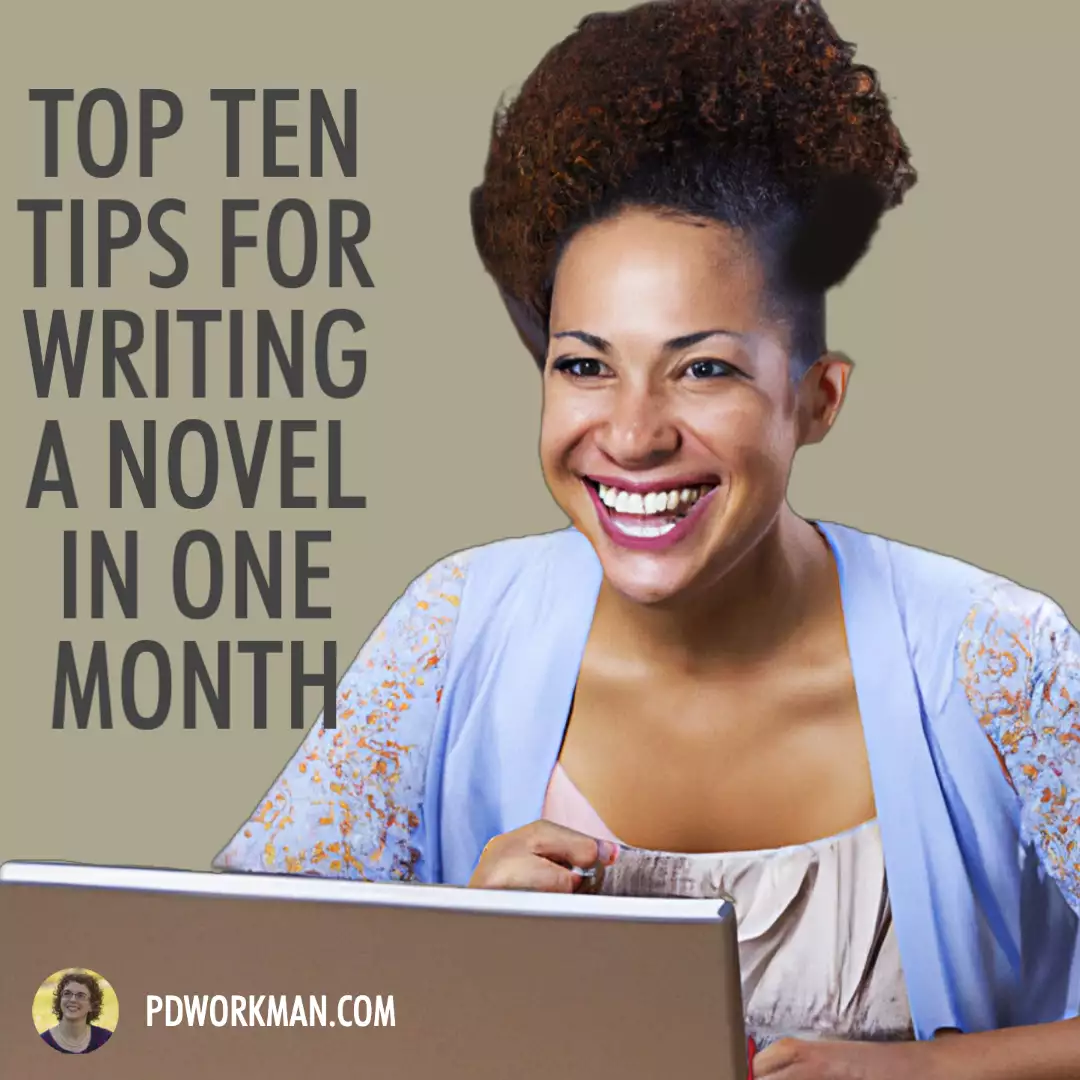
My Top Ten Tips for Writing a Novel in One Month
November 11, 2022

Writing a novel in a month, whether for National Novel Writing Month (NaNoWriMo) or another reason can be a daunting task—especially if you’ve never done so before. It doesn’t have to be difficult, however; with the right advice and steps, you can pull together a full-length book by November 30. The following ten tips will help you achieve success!
Do not be misled by romantic movies about blocked novelists who are inspired by a new person in their lives or by a holiday or by facing their biggest fear or regret. They pound out the next great American novel in a couple of hours during the night. To pound out a short novel of 50,000 words in eight hours, you would have to type at a sustained rate of 104 wpm, with no time for thinking about or planning the next sentence, let alone the plot of the novel, no time for bathroom breaks, and no time for (horror!) snacks.

That’s not going to happen. Approach writing your next novel with a plan of attack, and you will be far more likely to succeed.
These are some of my words of wisdom, but I acknowledge that no two writers are the same and no two books are the same. Pick out what works for you and leave the rest.
And yes, I am writing this blog post a third of the way through the month. While it is certainly possible to plan and write a novel in 20 days, I wouldn’t recommend it for your first time. But you can use this guide for whenever you decide to take on this undertaking, whether you are writing on your own, for Camp Nano in April or July, or November a year or two down the line.
DECIDE ON YOUR GENRE
This may seem like a no-brainer, but a lot of writers get stuck on this step. What is it you are writing? What genre will it fit into (even if it is a genre mashup)? Who is your audience? What are they expecting to see in a book categorized in this genre? What are the tropes? What is the central conflict in this genre? Are you writing about characters who solve a mystery? Go on an adventure? Fall in love? Learn magic?
Or are you a NaNo rebel and you’re going to write a non-fiction book this month. Or write a blog a day or a short story a day? Nail down the basic question of what first.
SET A WORD COUNT GOAL
The usual word count goal for NaNo is 50,000 words, which is about the lowest count as a traditional publisher will consider counts as a “novel.” This works out to 1667 words per day if you write every day of November. But many stories take longer than that to tell, and a lot of writers end up putting their half-complete NaNo novel aside at the end of the month and never taking it up again. If you decide to take a break in December because you are burned out, it will be much harder to get back into your book again. So start with a plan now. Will your book be longer than 50,000 words? Will you confine your writing to November, or go into December? Think about what will work for you.
CLEAR THE DECKS
November is a terrible month to write a full novel. Thanksgiving, preparations for Christmas and the beginning of office Christmas parties, long dark nights and short days… There are a hundred reasons not to write a book in November. But the same is true of any month. So let’s prepare by clearing the decks to write in November.
When I did NaNo the first few times, one of the things that I liked most was being able to make writing my priority for a month. Sure, I still had responsibilities in other areas of my life, but I would say “no” to any extras. I would tell people that I was writing a book that month. I would tell my family that I couldn’t do this or that until I had hit my word count. That they could make their own dinners and fine their own entertainment. I was NaNoing.
So if you are planning to NaNo, start saying “no” to anything extra and moving some of those responsibilities that you can back to October or forward into December. Yes, December will be busy, but December will always be busy.
CHOOSE YOUR MAIN CHARACTER

Even those who write “by the seat of their pants” (pantser or discovery writer) usually have a character in mind when they begin writing a book. Here is a person, caught in a situation. What kind of a person? What kind of a situations? What are some conflicts that they are going to run into? How will their background and present situation affect the outcome? Maybe you are not someone who plots out any detail. Maybe you don’t know where the storyline is going or where it will end, but you can think about who you are going to write about.
DEVELOP A PLOT OUTLINE
I am not going to tell the pantsers that they have to learn how to plot. Or that they have to write down at least a beginning, middle, and end for their book. Remember, every writer is different and every book is different. Some benefit from starting at the beginning, and plotting through in chronological order to the end. Some start in the middle and work outward. Some come in pieces that need to be assembled.
If you are a plotter, or a planster, or whatever other name that means you like to have something a little more structured before you begin to write, then spend part of October prepping. (Referred to by NaNo’s as “Preptober”). Whether you spend all of October, or just a few days or hours, start to sketch out the bits of the plot that will help you to write the book in NaNo. For planners, having a good plot structure in place can help prevent you from getting bogged down mid-month with a “saggy middle.”
WRITE EVERY DAY

Or not. I actually don’t. What is your goal here? Others do it to establish a daily writing habit, and the number of words doesn’t matter. For others, it is to hit a minimum of 1,667 words each and every day so that they will hit 50,000 by the end of November. Others just want to enjoy making writing a bigger priority for the month, and end up stressed and blocked if they are penned into a certain number of words or writing every day. So don’t write every day if that’s not what works for you. I write six days a week and take Sunday off. If I was writing a 50,000 word novel, that would mean writing 1,923 words per day six days a week instead of 1,667 words seven days a week. And for some people, being able to take a break for one day a week could mean the difference between success and failure.
Establish your intermediate/daily goals. Find what works for you. Plan for success, and then adjust.
It’s time to start writing! For most people, this is the fun part.
DON’T EDIT AS YOU WRITE
Or do. You will often hear this piece of advice given, particularly to newbies. The goal is not to get bogged down with writing and rewriting passages to be perfect, but instead to get momentum going and write down the structure of your story. You can go back later to tweak and polish it. Some writers are very militant about this. Don’t even press the backspace key if you make a typo. Just keep moving forward. Vomit words onto the page.

People are much more relaxed, just telling you not to get stuck in the minutia, and to just keep moving forward. And there are many writers in between. I use my backspace key. I rephrase a sentence or rewrite a paragraph where I need to. I re-read part of what I read yesterday before I start writing today. I know I can do all of that and still hit my daily quotas. Your experience may be different.
So instead, I would say look forward. Think about the next sentence, the next paragraph, the next plot point or chapter. If something needs to be fixed, it’s okay to just mark it with ** or // or 999 or [ ] to come back to later, and keep moving on for now. Feel free to make notes to yourself and go back to it later. For now, forward is generally the best way to get to the end of your book.
SET A DEADLINE FOR YOURSELF
If you are doing NaNo, your deadline is probably November 30. But it might not be. That might be your halfway point and your goal is to finish by December 31. Or some other date. You might not have a “final” deadline, but a daily quota. Or certain milestones that you will celebrate. Set deadlines in the way that works for you. Some people love working up against a hard deadline. Others freak out or melt down. What kind of goal works for you? Look back at past accomplishments for hints.
TAKE A BREAK BEFORE EDITING
When you are finished with your first draft, chances are, you are going to need to do a second draft. And a third. Who knows how many? If it is your first book, you might have a lot of drafts before you get to the point that you are comfortable with your story. Nanowrimo pushes December as the month to edit your NaNo book (mainly, I think, because publishers hate being inundated with unedited manuscripts on December first.)
But it can also be helpful to put your manuscript away to “season” for thirty days after writing it. This gives you a chance to look at it with fresh eyes. You’ll discover things that you didn’t remember you wrote. You’ll spot plot holes that you were blind to before. And it’s really kind of fun to go back to your NaNo novel to read it later and see how it really turned out.
A little bit of seasoning time can be very beneficial. I highly recommend it. (Note that I process all of my notes to myself and do one full edit immediately after writing. Then I put it away to season for 30 days. Find what works for you!)
HAVE FUN!

The best thing about Nanowrimo is the community. The NaNo website is, unfortunately, not as conducive as it once was to meet and talk with your new writer buddies on the site. But NaNo communities have sprung up on Facebook and Discord, you may have local community groups led by a municipal liaison, you may participate in meetups and writing sprints with professional organizations like Sisters in Crime. It is a lot of fun to be surrounded by other people who are just as crazy as you are, all striving toward similar goals, all raising the priority of writing in their lives for the month of November. You can write a novel any month of the year, but there is nothing like being surrounded by other people doing the same thing.
If you can, find some locals and join a meetup. Do a Zoom or Discord sprint session. Talk to other writers in your genre about what they are doing. Listen to the advice of oldsters who have been doing NaNo for years. Be buoyed up by the newbies who are excited to try it for the first time.
Don’t get so serious about meeting your quotas and achieving your goals that you lose sight of having fun along the way.
Okay, that wraps it up! I hope some of these tips are valuable to you. Feel free to comment below and let me know what you’re doing for NaNo and whether you love it—or hate it.
Originally blogged at pdworkman.com